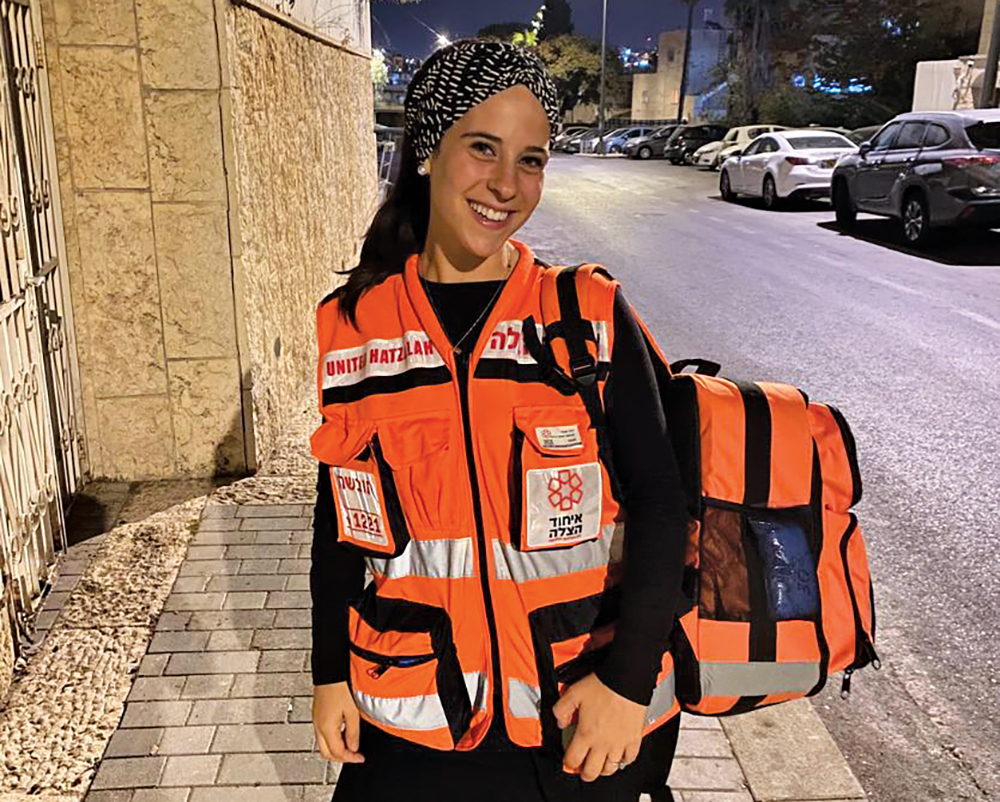
Five years ago, Edison native Rachel Feld was driving to her Ramot home with her husband when they witnessed a terrible accident on the highway. Feld, who has always prioritized helping others, felt helpless in that moment when others near her were in danger while she had no way of lending support. Vowing that she would never allow herself to be in a position like this again, she signed up for the first available Hatzalah course to become a certified EMT.
Ironically, one of the first dispatch calls she received after completing the intensive course was a call about a car accident late one night. She was with her ambulance team when she learned that four teenage boys were racing down the highway and one lost control and hit a lamp post. The driver who was not wearing a seatbelt was ejected from his car and unfortunately did not survive the impact. But unlike the car accident she witnessed one year earlier, this time Feld was equipped to provide care to the survivors whose lives had been transformed in a split second. “It made a real impact on me, that first call,” she explained. “It was a real reminder to me that anybody can make a difference.”
Since that first call, Feld has responded to hundreds of dispatches in her four years as a volunteer medic with Hatzalah. Sometimes she is on an ambulance shift with a team, responding to calls around Jerusalem and bringing patients that require further medical attention to the hospital. She may have as many as 12 calls in a five-hour shift. When she is on duty as a first responder, she answers calls that are placed by an individual in distress in a nearby location. As a first responder, Feld acts as the critical support before the ambulance arrives. Critical support includes administering CPR, controlling blood loss, delivering a baby, providing oxygen and more. These vital moments are sometimes a matter of life and death.
The first dispatch Feld received as a first responder came in just as she finished lighting the Shabbat candles. An elderly woman in her neighborhood was in respiratory distress. Feld’s husband was at prayer services so she dropped off her four children at a neighbor and rushed out the door. By the time she had arrived, the woman’s oxygen levels had plummeted. Feld administered oxygen with the equipment she had received just a few days earlier and stabilized her levels. She stayed with the woman until the ambulance team arrived and she returned home to her family to eat their Friday night dinner. Only then did she begin to process what had just happened, and that without the oxygen, this woman might not have survived. “I cannot believe that I had this opportunity and it was all thanks to this metal canister that I was given,” she recalled thinking that evening.
Hatzalah has a total of 7,000 volunteers. Feld is part of the Joel and Adele Samburg Women’s Unit, which is composed of female medics from around Israel who come from all religious and ethnic backgrounds and are united by their mission to rescue individuals in distress. She explained that having a woman present, especially when dealing with gynecologic issues or childbirth, adds a level of sensitivity that goes beyond providing medical treatment.
A few weeks ago, Feld answered a dispatch from a woman in labor. It was Feld’s 12th delivery, but this one was particularly meaningful to her. The woman and her husband are from the western Negev. They lost their home in the Oct. 7 massacres and were evacuated to Jerusalem. Feld was with the woman for a few hours and was invited to the baby naming the next day. The parents named the baby girl Emunah, or “faith.” The delivery, which Feld called “a beacon of light” for two people who lost so much, was a particularly emotional demonstration of life after death and of the will of the Jewish people to rebuild.
Not all her missions end in a positive way. She acknowledged that there are highs and lows in her day-to-day operations. But it’s that feeling of being by a person’s side in his or her moment of distress that helps Feld get through the challenging points. She smiled when she shared that her children often play first responder at home, and they proudly tell their friends about their mother’s life-saving rescue missions. She admitted that when she returns home, it is not always easy to remove herself from the stressful and emotional situations that are still on her mind, but she insists that before she is a medic, she is a mother. She finds the time to cry, but she also fights to compartmentalize and “close that box and put it away.”
Feld hopes to continue this path and take a three-year paramedic course, which will allow her to take on more responsibilities as an EMT. Looking back to 2019 when she first thought about taking the Hatzalah course, she is aware of how far she has come. Initially she was concerned that as an immigrant, her Hebrew would not be up to par and that she might struggle with the cultural differences. But she did not let her fears hold her back. She feels privileged to be able to be part of this life-saving operation and emphasizes that anybody and everybody can make an impact. “You don’t have to be a superhero to make a difference,” she said.
Visit israelrescue.org for more information.
Alisa Bodner is a Fair Lawn native who immigrated to Israel a decade ago. She is a nonprofit management professional who enjoys writing in her free time.










